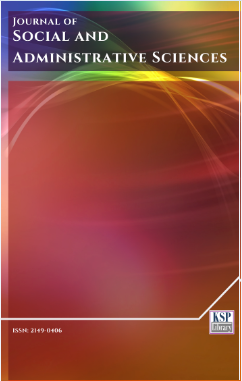Post conflict reconstruction efforts in tribal areas of Pakistan through informal education
Abstract
Abstract. The paper is a first effort of its kind to discuss the issue of post conflict reconstruction efforts in the tribal belt of Pakistan by focusing on soft skills and peaceful behavior of locals on account of informal means of delivering education. The paper explains why informal education in comparison to formal schooling isa preferred strategy to change the behaviors of locals towards subtle national integration in short time span. The paper presents the learning initiatives and possible outcomes with help of academic literature that focuses on post conflict reconstruction efforts in regions like Africa and Asia.
Keywords. Education, Informal educaton.
JEL. A11, A14, A20.
Keywords
References
Alexander, H., Pinson, H., & Yonah, Y. (2010). Citizenship, Education and Social Conflict, Routledge.
Africa Dialogue, (2012). Integrating Traditional and Modern Conflict Resolution: Experiences from Selected Cases in Eastern and the Horn of Africa, Monograph Series No.2.
Bauch, J. (1999). Selbstbefahigungoder manipulation? Eine contra-position zur peer-education. Jugend and Gesellschaft, 4, 8-9.
Ben-Porath, S.R. (2006). Citizenship Under Fire. Democratic Education in Times of Conflict, Princeton, New Jersey: Princeton University Press
Bronkhorst, S. (2011). Climate Change and Conflict: Lessons for Conflict Resolutionfrom the Southern Sahel of Sudan. Durban: African Centre for the Constructive Resolution of Disputes. [Retrieved from].
Buckland, P. (2005). Reshaping the Future: Education and Postconflict Reconstruction. Washington, DC: The World Bank. [Retieved from].
Connolly, P., Smith, A., & Kells, B. (2002) Too Young to Notice? The Cultural and Political Awareness of 3-6 Years Olds in Northern Ireland, Belfast: Community Relations Council. [Retrieved from].
Elhussein, A.M. (1989). The revival of native administration in Sudan: A pragmatic view. Public Administration and Development, 9(4), 437-446. doi. 10.1002/pad.4230090409
Fischer, M., & Tumler, J. (2000) Moglichkeiten der Forderungeiner Peace Constituency in Bosnien-Hercegovina.AnsatzimBereich der Jugend-Bildungs-und Kulturarbeit, StudieimAuftrag der GTZ (Eschborn), Berghof Report No.5, Berlin.
Green, A., Preston, J., & Sabates, R. (2003). Education, Equality and Social Cohesion: A Comparative Analysis, Palgrave Macmillan.
Kauzya, J.M. (2007). Political decentralisation in Africa: The experience of Rawanda, Uganda and South Africa. UNDP Department of Socio-Economic Affairs, Discussion Paper.
Maringer, E., & Steinweg. R. (1997). Konstruktive haltungen und verhaltensweisen in institutionellen konflikten, Berlin: Berghof forschungszentrum für konstruktive konfliktbearbeitung. [Retrived from].
Ndengiza, F. (2007). Social cohesion in Rawanda: An opinion survey, Kigali: National Unity and Reconciliation Commission. [Retrieved from].
Paisajoven, GTZ, (1999). Jugend und Partizipation.Analysen und Reflexionen, Medellin: Corporcion Paisajoven.
Rudolph, H.H. (1999). Jetzt redden wir! Jugend, lebensweltbezogeneBildung und Gemeindeentwicklung in Lateinamerika. Frankfurt/M: IKO-Verlag.
Smith, A., & Vaux, T. (2003). Education, conflict, and international development. London: Department of International Development.[Retrieved from].
Wedge, J. (2008). Where peace begins: Educations’s role in conflict prevention and peace building. London: Save the Children UK.
DOI: http://dx.doi.org/10.1453/jsas.v4i3.1437
Refbacks
- There are currently no refbacks.
....................................................................................................................................................................................................................................................................................................................................... Journal of Social and Administrative Sciences - J. Adm. Soc. Sci. - JSAS - www.kspjournals.org
ISSN: 2149-0406
Editor: editor-jsas@kspjournals.org Secretarial: secretarial@kspjournals.org Istanbul - Turkey.
Copyright © KSP Library




